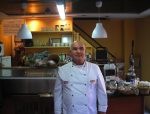Chef David Polivoda (photo from David Polivoda)
When people reflect on Israel’s transformation since the establishment of the state in 1948, they often focus on geographic, political, economic and social changes. Slightly less tumultuous, but no less dramatic, has been Israel’s culinary development. In a country where people like to eat, and to eat a lot, the past 69 years has witnessed an amazing transition in Israeli food habits.
In the first years of statehood, for example, salad fixings were hard to come by, largely due to Israel’s tzena, or austerity program (1949-1959). Yet, even well after the lifting of the tzena, a salad meant finely chopped tomatoes and cucumbers, maybe with some onion and parsley, with a little lemon juice and olive oil. And this remains a classic Israeli salad. However, the days of such limited ingredients have come and gone.
While certain fruits and vegetables are, of course, seasonal – when you see ample supplies of strawberries and artichokes, you know Pesach is on the way – there is no end to the variety now available. Israeli farmers seem to have mastered the ability to grow just about everything. And this is just the tip of the iceberg, as former chef David “Poli” Polivoda explained about the evolution of Israeli food and palates.
First, a bit about Polivoda’s professional background. He began cooking shortly after his army service. Back then, he lived on a kibbutz by the Dead Sea, where he was part of a soldiers’ group that settled in the area. After his discharge, he studied carpentry and animation, but discovered – to the chagrin of the animation studio director – that his true vocation was cooking. He began his career in the Kibbutz Ein Gedi kitchen and, afterward, in its guesthouse.
Since then, Polivoda has worked in Jerusalem corridor guesthouses, on Magic One cruise ships, at the Osem food conglomerate, at various elite Jerusalem hotels, including the King David, and has done chef stints in Europe and in the United States. He also has been a restaurant inspector and now gives culinary tours of Jerusalem’s Mahane Yehuda.

When he first started out, cooking as a profession was not highly regarded. Nowadays, there are countless cookbooks, culinary websites and workshops, televised cooking shows and chef competitions – his chosen profession has earned a “wow” rating. In Israel, Polivoda said there are several places to learn to be a professional chef and there are certificates and national (government) achievement-based licences, as well as more than one association of Israeli chefs.
When he was starting out, a typical meal in a nice hotel meant a steak dinner. Meat was, and still is, relatively expensive, and much of it is imported. Back then, there were few restaurants and the average Israeli’s financial situation did not permit dining out. At home, Israelis typically ate an evening meal of bread, salad, eggs, cheese and plain yogurt (pretty close to what people ate for breakfast).
Polivoda said kashrut limitations have resulted in a lot of creativity as far as food preparation is concerned. For example, Italian cooking has become very popular with Israelis, despite the prohibition against mixing milk and meat – in downtown Jerusalem alone there are at least six kosher Italian dairy restaurants. Israeli chefs have learned to successfully produce tasty meatless Italian dishes.
With respect to hotel meals, Polivoda said the meals are generally much larger than those most Israelis would eat at home. He said in a hotel restaurant, people eat at least a third more. In hotels, buffets are set up for breakfast, lunch and dinner and the focus is on a display of abundance, he explained. Salads were, and remain, an important part of the buffet, but, according to Polivoda, an economic reason lies behind the plentiful spread – a buffet means less wait staff is needed.
He explained that, while hotel management seeks a high level of prepared food, it wants to have it made as cheaply as possible. Thus, restaurants might lower their costs by using cheaper raw ingredients. Two examples of this are Israeli mock chopped liver made from eggplant, rather than from liver, and “Ben-Gurion rice” or ptitim, which are really tiny pieces of hard wheat, that is, pasta.
Still, Polivoda said it is the chef who makes the lasting impression on guests, not the eatery’s manager. And, he said, when people eat out today, they expect more than they did in the past.
Eating habits in Israel have changed for a variety of reasons.
First, Israel is economically better off overall. Many Israelis can afford to travel abroad and those who do come back want to re-experience the tastes they enjoyed during their travels.
As well, Israel now imports a wide range of food products, so people are exposed to more variety. Additionally, the Israeli food industry not only services the increasingly cosmopolitan local population, but has made major inroads in exporting agricultural products.
Finally, Polivoda noted that, on the one hand, Israelis are proud of their cultural background while, on the other hand, they try to turn everything into a business. One result is a broader diversity of choices, with more ethnic restaurants trying to cater to an increasingly diverse population.
However, it’s a tough industry, and Polivoda predicted that many restaurants would come and go, as there are people who go into the business without understanding how hard it is to stay afloat. Meals will become somewhat less plentiful, he said, also noting that there is much waste in the industry.
He presented two optimistic points: prices for dining out will decrease and, as the in-gathering of exiles continues, with newcomers wanting to enjoy something from their roots, ethnic food will continue to have a place in Israeli cuisine.
Deborah Rubin Fields is an Israel-based features writer. She is also the author of Take a Peek Inside: A Child’s Guide to Radiology Exams, published in English, Hebrew and Arabic.

